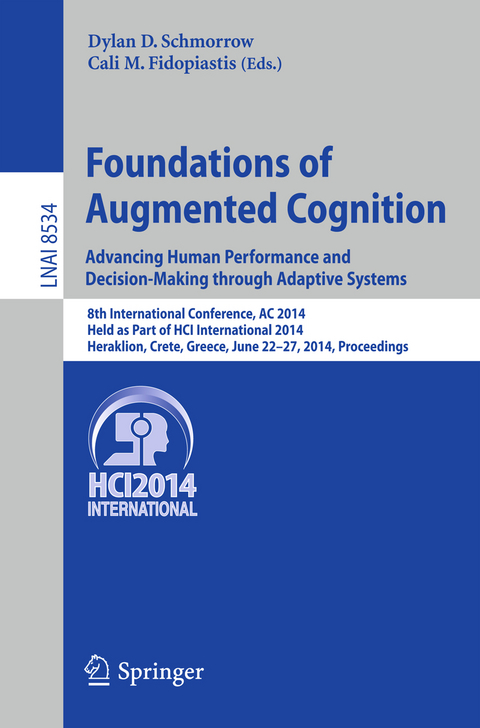
Foundations of Augmented Cognition. Advancing Human Performance and Decision-Making through Adaptive Systems
Springer International Publishing (Verlag)
978-3-319-07526-6 (ISBN)
Emotional and Cognitive Issues in Augmented Cognition.- Physiological Synchronization Is Associated with Narrative Emotionality and Subsequent Behavioral Response.- A Social-Cognitive Prediction of the Perceived Threat of Terrorism and Behavioral Responses of Terrorist Activities.- Untangling Operator Monitoring Approaches When Designing Intelligent Adaptive Systems for Operational Environments.- Semantic Representation Analysis: A General Framework for Individualized, Domain-Specific and Context-Sensitive Semantic Processing.- Toward Multi-brain Communication: Collaborative Spelling with a P300 BCI.- Deducing User States of Engagement in Real Time by Using a Purpose Built Unobtrusive Physiological Measurement Device: An Empirical Study and HCI Design Challenges.- Ubiquitous Augmented Cognition.- Our Emotions as Seen through a Webcam.- Machine Learning for Augmented Cognition.- Neural Network Estimation of Atmospheric Thermodynamic State for Weather Forecasting Applications.- Augmenting Human Cognition with Adaptive Augmented Reality.- Two Steps Back for One Step Forward: Revisiting Augmented Cognition Principles from a Perspective of (Social) System Theory.- Mining and Modeling the Phenomenology of Situational Awareness.- Team Behaviors and Cognitive Cohesion in Complex Situations.- Architecture for Machine Learning Techniques to Enable Augmented Cognition in the Context of Decision Support Systems.- Teams Reorganize Neurodynamically When They Sense Loss of Control.- Assessing Neural Synchrony in Tutoring Dyads.- Augmented Cognition for Learning and Training Insights into User Personality and Learning Styles through Cross Subject fNIRS Classification.- Using a Cognitive/Metacognitive Task Model to Analyze Students Learning Behaviors.- Just Enough Fidelity in Student and Expert Modeling for ITS: Making the Practice Practical.- How the Granularity of Evaluation Affects Reliability of Peer- Assessment Modelization in the OpenAnswer System.- What Is Adaptivity? Does ItImprove Performance.- Visualizing Adaptive Learning Effects on Clinical Skill Acquisition and Decay.- How Real Is Good Enough? Assessing Realism of Presence in Simulations and Its Effects on Decision Making.- Utilizing the Generalized Intelligent Framework for Tutoring to Encourage Self-Regulated Learning.- Using Learner Data to Influence Performance during Adaptive Tutoring Experiences.- Augmented Cognition for Health and Rehabilitation An Alternative Design Perspective for Technology Supporting Youngsters with Autism.- The Predictability of Pharm-EEG in Patients with Long Unconscious Status.- Somneo: Device with Thermal Stimulation for Modulating Sleep Architecture and Enhancing Neuro-Cognitive Function.- Contribution of Biosensors to Enhancing Performance for Users with Special Needs.- Finding Keys for People with Mild Dementia - Not Just a Matter of Beeping and Flashing.- Patients Initiated Timeline Marking of Events in Parkinson's Disease: Visualization of Time Correlation between Patients Marked Events and Acquired Data from Sensors.- Biomarker and Biometric Indices of Cognitive Decrements due to Physical Exhaustion.- Smartphones, Smart Seniors, But Not-So-Smart Apps: A Heuristic Evaluation of Fitness Apps.- Towards Medical Cyber-Physical Systems: Multimodal Augmented Reality for Doctors and Knowledge Discovery about Patients.
| Erscheint lt. Verlag | 23.5.2014 |
|---|---|
| Reihe/Serie | Lecture Notes in Artificial Intelligence | Lecture Notes in Computer Science |
| Zusatzinfo | XXII, 372 p. 113 illus. |
| Verlagsort | Cham |
| Sprache | englisch |
| Maße | 155 x 235 mm |
| Gewicht | 605 g |
| Themenwelt | Mathematik / Informatik ► Informatik ► Betriebssysteme / Server |
| Informatik ► Software Entwicklung ► User Interfaces (HCI) | |
| Schlagworte | Artificial Intelligence • augmented cognition • augmented reality • cognitive science • Cyber-Physical Systems • eLearning • E-Learning • Emotions • HCI • Healthcare • human centered computing • Human Computer Interaction • machine learning • Scene Understanding |
| ISBN-10 | 3-319-07526-8 / 3319075268 |
| ISBN-13 | 978-3-319-07526-6 / 9783319075266 |
| Zustand | Neuware |
| Haben Sie eine Frage zum Produkt? |
aus dem Bereich


